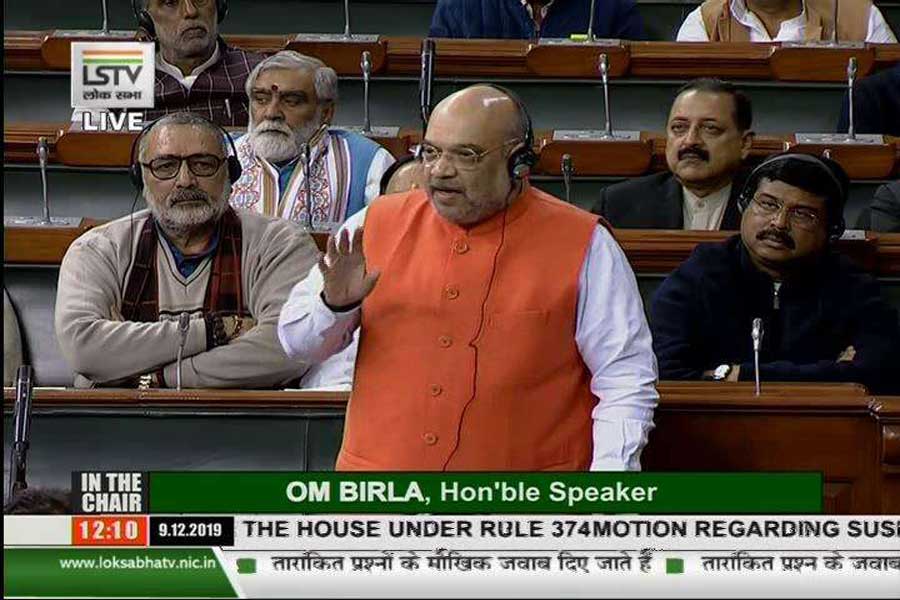The Modi government cleared the Citizenship (Amendment) Bill, 2019 in a cabinet meeting on December 4, 2019 and it was passed yesterday (December 9), in the Lok Sabha. The Bill proposes to amend Section 2 (1) (b) of the Citizenship Act, 1955 by excluding “persons belonging to minority communities, namely, Hindus, Sikhs, Buddhists, Jains, Parsis and Christians from Afghanistan, Bangladesh and Pakistan” from the ambit of “illegal immigrants”.
The Bill further proposes to amend clause (d) of the Third Schedule of the Citizenship Act, 1955 by reducing the period of residence in India, for those from the above-referred religious communities, for the acquisition of Indian citizenship through naturalization to six years from the earlier period of twelve years.
According to the Citizenship Act, 1955, illegal migrants cannot get citizenship of India. Under the Act, illegal migrants are those who have entered India without a valid passport or other prescribed travel documents or those who have come to India with a valid passport or other prescribed travel documents but have stayed here longer than the permitted period of time. These illegal migrants can either be kept in jail or sent back to their respective countries under the Foreigners Act, 1946 and the Passports (Entry into India) Act, 1920. The Bill seeks to ensure that people belonging to the above-referred six communities who are in India without valid travel documents can neither be imprisoned nor deported.
The Bill makes two classifications: one based on religion (only Hindus, Sikhs, Buddhists, Jains, Parsis, and Christians are granted protection from being convicted as illegal immigrants) and one based on country (the above-referred six religious communities only from Afghanistan, Pakistan and Bangladesh are eligible for citizenship through naturalization). By distinguishing illegal immigrants on the basis of religion, the Bill goes against the constitutional guarantee of the fundamental right to equality under Article 14 of the Constitution of India. Article 14 of the Constitution of India reads as under: “The State shall not deny to any person equality before the law or the equal protection of the laws within the territory of India.”
Thus, the protection of Article 14 applies to “any person”—both citizens and foreigners. Equality before the law prohibits discrimination by the State. The Bill makes a distinction on the basis of religion for granting citizenship. The concept of “equal protection of the laws” permits the State to give special treatment (such as affirmative action) to persons in different situations in order to establish equality amongst all. This implies equality amongst equals, that is, equals are to be treated equally, whilst un-equals cannot be treated equally.
The test for determining whether a law distinguishing between individuals or classes violates Article 14 is two-fold (Uttar Pradesh Power Corporation Ltd v Ayodhya Prasad Mishra): (1) There should be a reasonable classification which must be founded on an intelligible differentia which distinguishes persons or things that are grouped together from others left out of the group; and (2) Such differentia must have a rational nexus to the legislative object sought to be achieved by the legislation in question.
Differential treatment does not per se constitute a violation of Article 14. It denies equal protection only when there is no reasonable basis for the differentiation.
In State of West Bengal v Anwar Ali Sarkar, the Supreme Court explained that intelligible differentia means that there must be a yardstick to differentiate between those included in, and excluded from the group. The object of the amendment brought in by the Bill is to ‘protect those who have faced religious persecutions in Afghanistan, Pakistan, and Bangladesh’. However, by excluding Muslims from the category of ‘persecuted’, the proposed law is based on a premise that only Hindus, Sikhs, Buddhists, Jains, Parsis and Christians face religious persecution in a Muslim-majority country. Such a premise does not differentiate as to why the above-referred cases of religious persecution are different from other similar cases such as Shias facing religious persecution in Pakistan or Tamils facing persecution in Sri Lanka or Rohingyas facing religious persecution in Myanmar.
The range and scope of Article 14 has been widened by judicial interpretation so that the right to equality now not only means the right not to be discriminated against but also protection against any arbitrary or irrational act of the State (Pradeep Kumar Biswas v Indian Institute of Chemical Biology). Arbitrary action is described as one that is irrational and not based on sound reason or as one that is unreasonable (Om Kumar v Union of India).
“Manifest arbitrariness” has been defined by a constitutional bench of the Supreme Court recently in Shayara Bano v Union of India as a law being disproportionate, excessive or otherwise being manifestly unreasonable, or when it is not fair, not reasonable, discriminatory, not transparent, capricious, biased, with favouritism or nepotism. It must be something done by the legislature capriciously, irrationally and/or without adequate determining principle.
The country-based classification in the Bill also violates Article 14 as it fails the “manifest arbitrariness” test laid down in the Shayara Bano case. The common link connecting the three countries in the Bill is that they are Muslim-majority countries and that they are India’s neighbours.
In general, the presumption is always in favour of the constitutionality of a law, since it is assumed that the Legislature understands the needs of the people. However, where the statute shows on the face of it that the Legislature made no attempt at all to make a classification but singled out a particular individual or class without having any difference peculiar to that individual or class, the presumption of reasonableness in favour of the Legislature is instantly rebutted (State of Bombay v Balsara, AIR 1951 SC 318). It is unfathomable why Muslims have been presumed to be not at risk of persecution when at present the Rohingyas of Myanmar are one of the most persecuted communities in the world.
The Bill is based on religion-based classification which is violative of Article 14 of the Constitution because such classification is not based on any intelligible differentia which can explain why Muslims have been left out as beneficiaries under the Bill, and the classification does not have any nexus with the object of the bill to save persecuted religious minorities.
The country-based classification is manifestly arbitrary and violative of Article 14, as it is not based on any determining principle. The Bill, if it ultimately becomes the law of the land after getting the nod of approval from both the Houses of Parliament, is liable to be struck down by the Courts for being unconstitutional and going against the basic structure of the Constitution.
(By arrangement with IPA/The Leaflet)







